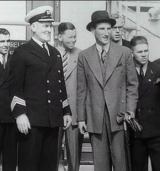The regular Monday column in which Steven Lynch answers your questions about (almost) any aspect of cricket:

|

Garry Sobers declared twice in the 1967-68 series and Colin Cowdrey, the England captain, accepted it with glee as England went on to win the match and with that the series as well
© Getty Images
|
|
Graeme Smith declared twice in the Sydney Test - and lost. Has this ever happened before? asked Johan van der Knaap from Pretoria
It has only happened once before - in 1967-68, when Garry Sobers of West Indies declared twice
at Port-of-Spain, and ended up not only losing the match to England, but the series too. There's a case for saying it also happened in the infamous match
at Centurion in 1999-2000, when Hansie Cronje of South Africa earned himself a leather jacket by declaring his first innings and forfeiting the second in a bid to ensure a positive result against England. On 22 other occasions a captain has lost a Test match after declaring one of his innings. The most recent before the one
at Sydney last week was in 2004, when West Indies declared their first innings of the third Test
at Old Trafford, but ended up losing. For Andrew Miller's recent piece on declarations that failed,
click here.
How many batsmen have scored a century in their 100th Test, as Ricky Ponting has just done? asked Belinda Green from Melbourne
Ricky Ponting was the sixth man to score a hundred in his 100th Test - but the first to make two. The first one to do it was also the first man to play a century of Tests - Colin Cowdrey, for England against Australia
at Edgbaston in 1968. Since then the feat has also been achieved by Javed Miandad, Gordon Greenidge, Alec Stewart and Inzamam-ul-Haq, before Ponting joined the club
at Sydney. For a full list, including the matches,
click here.
Jeetan Patel, New Zealand's supersub, won the Man of the Match award in one of the ODIs against Sri Lanka last week. Is this the first time the supersub has won the award? asked Ross Simmonds
Patel did indeed do this in the match against Sri Lanka
in Wellington last week. But it was another New Zealander who was the first supersub to win a Man of the Match award: Shane Bond, who took 6 for 19 after replacing Nathan Astle against India
at Bulawayo in August 2005.
How many Tests and ODIs have India and Pakistan played, and what are the results? asked Ali Baig from Canada
Prior to the series
which begins on Friday India and Pakistan had played
53 Test matches - Pakistan have won eleven and India eight, with 34 draws (12 of them in a row between 1952-53 and 1960-61). Of those, 23 have been played in Pakistan, who have won six to India's two. The two countries have also contested
101 ODIs, of which Pakistan have won 62 and India 35, with four no-results. Of those, 20 have been in Pakistan, who lead 12-6 in wins with two no-results.
Who threw the rugby ball to Glenn McGrath when he got injured at Edgbaston? asked Timmy Chambers
The unfortunate man who might just have turned the destiny of the Ashes shortly before last year's dramatic
Edgbaston Test was Australia's reserve wicketkeeper. Glenn McGrath explained at the time: "I was just standing there with
Brad Haddin. I turned to chase a ball, and my first step planted straight on top of a cricket ball that was on the ground. I'd seen them laid out earlier and thought how neat they looked - it was just one of those things ... I knew before I hit the ground that I was out of the match."
I have a question that has bothered me for a long time. Can you tell me the name of the ocean liner that took Douglas Jardine's famous "Bodyline" team to Australia? asked David O'Keeffe

|

Douglas Jardine faces the media ahead of sailing off in Orontes to Australia in 1932
© Cricinfo Ltd
|
|
Just about the definitive account of that
infamous 1932-33 tour is David Frith's superb 2002 book
Bodyline Autopsy, so I had a look in there. He says: "On Saturday, September 17, 1932, the English (MCC) team gathered on the deck of the Orient Line steamship
Orontes to be introduced to the captain by their captain, DR Jardine." The voyage took 31 days: the ship stopped at Gibraltar, Toulon, Naples, Port Said, Aden and Colombo before berthing in Fremantle, near Perth in Western Australia, for the start of what - until 2005 at least - was cricket's most dramatic series.
Steven Lynch is the deputy editor of The Wisden Group. For some of these answers he was helped by Travis Basevi, the man who built Stats Guru and the Wisden Wizard. If you want to Ask Steven a question, contact him through our feedback form. The most interesting questions will be answered each week in this column. Unfortunately, we can't usually enter into correspondence about individual queries.

